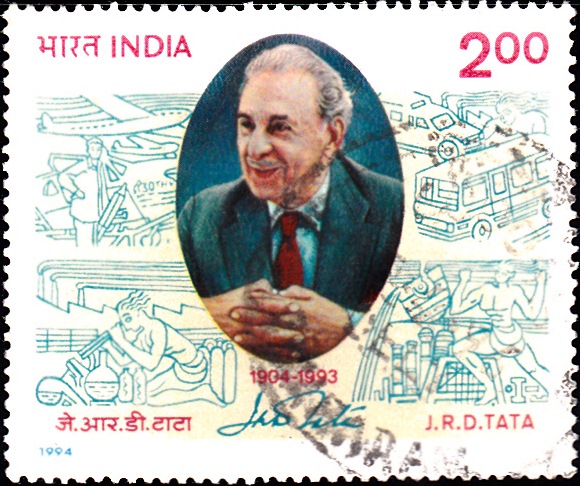
J.R.D. Tata
A commemorative postage stamp on the 1st Death Anniversary of Bharat Ratna JRD Tata, chairman of Tata Group and 1st licensed pilot in India :
 Issued by India
Issued by India
Issued on Nov 29, 1994
Issued for : The Department of Posts is privileged to issue a commemorative postage stamp today on J.R.D. Tata.
Credits :
Stamp design : Shri C.R. Pakrashi based on the materials supplied by Tata Sons, Bombay.
FDC : Tata Sons, Bombay.
Cancellation : Smt. Alka Sharma, Dept. of Posts.
Type : Stamp, Postal Used
Colour : Multi Colour
Denomination : 200 Paise
Overall size : 4.83 x 4.06 cms.
Printing size : 4.40 x 3.60 cms.
Perforation : 13 x 13
Paper : Imported Un W/M Adhesive Gravure Coated Stamp Paper in Sheets of 50.8 x 53.5 cms.
Number of stamps Printed : 1 Million
Number per Issue sheet :20
Printing Process : Photogravure
Printer : I.S.P., Nasik Road
Name : Jehangir Ratanji Dadabhoy Tata
Born on Jul 29, 1904 at Paris, France
Died on Nov 29, 1993 at Geneva, Switzerland
About :
- J.R.D. Tata stood out as one of the great personalities of India in the twentieth century.
- Born in Paris in 1904, he was appointed the Chairman of Tata Sons Limited at the age of 34. With his charismatic and forward-looking leadership Mr. Tata, in a career spanning well over half a century, not only led the Tata Group to new heights of achievement but also set standards for Indian industry as a whole. Expanding under his stewardship, the Group now covers a range which encompasses steel, generation of power, engineering, hotels, consultancy services, information technology, consumer goods and industrial products.
- A pioneer of civil aviation in the country, Mr. Tata ushered in the era of air transport in India in 1932. This enterprise blossomed into Air–India International which proudly carried the Indian flag to all parts of the globe.
- He also crusaded for causes which he felt were in the national interest such as family planning and population control. A dedicated educationist, Mr. Tata firmly believed that the spread of literacy, particularly among women, would raise the standard of living of the Indian people.
- Mr. Tata gave public expression to the guiding principles of his life as far back as 1965 when he said:
“Nothing worthwhile is ever achieved without deep thought and hard work;
One must think for oneself and never accept at their face value slogans and catch phrases to which, unfortunately, our people are too easily susceptible;
One must forever strive for excellence, or even perfection, in any task however small, and never be satisfied with the second best;
No success or achievement in material terms is worthwhile unless it serves the needs or interest of the country and its people and is achieved by fair and honest means;
Good human relations not only bring great personal rewards but are essential to the success of any enterprise”.
- Numerous national and international honours were bestowed on Mr. Tata. He was awarded the Knight Commander of the Order of St. Gregory the Great (Papal Honour bestowed by His Holiness Pope Paul V on the occasion of his visit to India in December 1964); Honorary Air Vice-Marshal, Indian Air Force, 1974; Knight Commander’s Cross of the Order of Merit of the Federal Republic of Germany, August 1978; Doctor of Laws (Honoris Causa), University of Bombay, 1981; Bessemer Medal of the Institute of Metals, London, 1986; Daniel Guggenheim Medal Award for 1988, Daniel Guggenheim Medal Board of Award; United Nations Population Award for 1992.
- He was conferred the country’s highest honour the ‘Bharat Ratna’ in 1992.
- Despite all this Mr. Tata remained a modest man. He was sensitive to the needs of his employees and his natural compassion and liking for people endeared him to thousands in all walks of life.


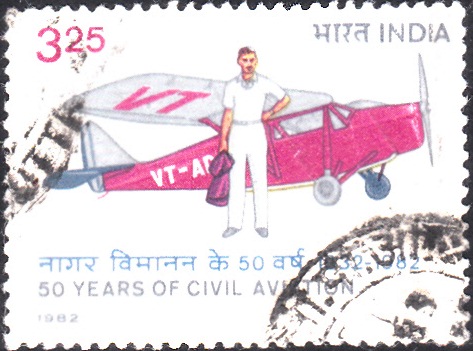
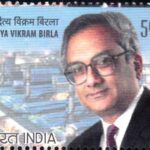
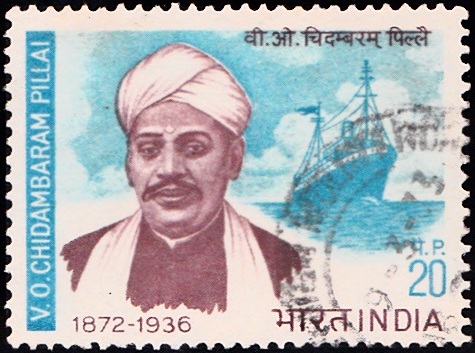
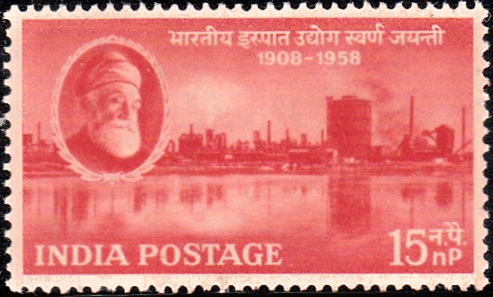
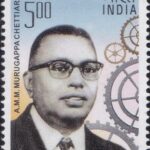
[…] he was admitted as a Member of the prestigious Royal Aero Club, in England – along with JRD Tata, the only other Indian member. He was later admitted as a member of the United Services Club in […]
[…] with the UK based Imperial Airways. The aviation industry gathered momentum in 1932 when J.R.D. Tata founded Tata Airlines which later became Air India, the national carrier of independent India. In […]
[…] the Indian pioneers, J.R.D. Tata was the first person to receive the Aviator’s Certificate from the Aero Club of India and […]